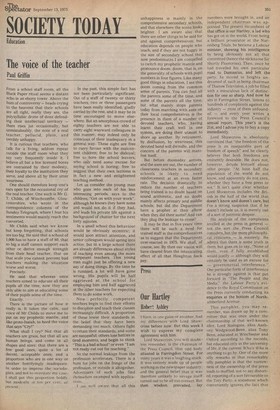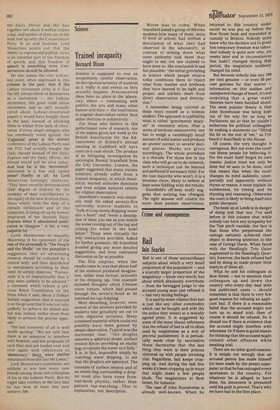Press
Our Hartley
Robert Ashley
I have, in one guise or another, had my differences with Lord Shawcross before now. But this week I wish to express my complete agreement with him.
Lord Shawcross, you will doubtless remember, is the chairman of the Press Council, that odd body situated in Farringdon Street. For many years it was a laughing stock. It was entirely made up of people working in the newspaper industry, and the general belief that it was therefore unlikely to savage itself turned out to be all too correct. But then wisdom prevailed, lay members were brought in, and an independent chairman was appointed. The present incumbent of that office is our Hartley; a lad who has got on in the world, From being a brilliant prosecutor at the Nur emberg Trials, he became a Labour minister, showing his intelligence by being obviously not all that committed (hence the nickname Sir Shortly Floorcross). Then, once he had travelled his own particular road to Damascus, and left the party, he moved to heights undreamed of, such as being chairman of Thames Television, a job he filled with a miraculous lack of distinction for one so sharp. And now he sits in Farringdon Street, listens to hundreds of complaints against the industry — most of them unfounded -and every year writes a foreword to the Press Council's annual 'report. This year's is the 21st, and I advise you to buy a copy immediately.
Lord Shawcross is absolutely convinced that "the freedom of the press is an inseparable part of freedom of speech" and he clearly believes that both freedoms are eminently desirable. He does not, however, delude himself about other people: "At least half the population of the world do not know, and apparently do not care, whether they have a free press or not." It isn't quite clear whether Lord Shawcross includes the British in the half of the world that doesn't know and doesn't care, but I've a strong suspicion that if he doesn't include us, it is merely out of a sort of patriotic despair.
His analysis of the complaints levelled at the press in general — not the sort the Press Council considers, but the more philosophical criticisms — is masterly. He admits that there is some truth in them, but goes on to say, "None of them, even if fully established would justify — although they will certainly be used as an excuse for governmental interference." One particular form of interference he is strongly against is that put forward in "The People and the Media" the Labour Party's evidence to the Royal Commission on the Press currently conducting its enquiries at the bottom of Northumberland Avenue.
This pamphlet, you may remember, was drawn up by a committee that was once under the chairmanship of that well-known idiot, Lord Stansgate, alias Anthony Wedgwood-Benn, alias Tony Benn, educated at Winchester and Oxford according to the records, but educated only in the university of life, if the current Who's Who is anything to go by. One of the more silly remarks in that remarkably silly pamphlet is that the narrowness of the ownership of the press leads to muffled, not to say distorted, reporting of a sort favourable to the Tory Party. a statement which conveniently ignores the fact that
the Daily Mirror and the Sun together sell about 8 million copies a day, and neither of them are in the least tied up with the Conservative Party. In an acid footnote, Lord Shawcross points out that the liberty to express and publish views is an essential part of the freedom of speech, and that freedom of speech is something even Conservatives should be allowed.
He also makes the very well-taken point, often expressed in this column in the .past, that if the Labour movement (why is it that the left always think of themselves as a -movement the Labour movement, this great trade union movement, and so on?) actually cared about Labour-orientated papers it would have bought them in the past, instead of allowing them to wither from lack of circulation. If every single delegate who has mindlessly voted against the 'Capitalist' press at the annual conference of the Labour Party and the TUC had actually bought the Daily Herald instead of the Daily Express and the Daily Mirror, the Herald would still be alive today. And how far is the 'movement' interested in a free and varied press? Hardly at all. As Lord Shawcross cuttingly observes: "They have recently demonstrated their degree of interest by the modesty of their contributions to the equity of the new Scottish Daily News which, with the help of a certain millionaire and of the taxpayers, is being set up by former employees of the Scottish Daily Express When it abandoned publication in Glasgow." A hit, a very palpable hit.
Lord Shawcross is equally discerning in his treatment of the rest of the proposals in 'The People and the Media': on the pamphlet's suggestion that all advertising revenue should be collected by a central body and then distributed to newspapers according to their need, he simply observes, "Fortunately it is so impracticable that it may seem unlikely to be adopted," a comment which echoes a previous Royal Commission on the Press when it said, about a Fabian Society suggestion, that it rejected it on the ground that it was not only unlikely to achieve its stated aim but was, indeed, rather more than likely to achieve the precise opposite.
The last comment of all is well worth quoting: "We are told that there is no intention to interfere with freedom, and the proposals (if such they are) are loaded over and over again with references to 'democracy.' there were similar assurances from the lateMr Lenin."
Lord Shawcross's comments are unlikely to win him many new friends among those old colleagues of his in the Labour Party. But he might take comfort in the fact that he has won at least one new admirer. Me.



































 Previous page
Previous page